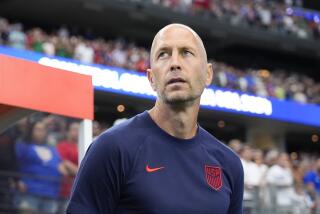WORLD CUP ’90 : Revenge for West Germany, 1-0 : Argentina Disputes Loss on Penalty Kick
- Share via
ROME — One month and 52 games after it began, soccer’s World Cup was decided in a most anti-climactic fashion--on a controversial penalty kick six minutes from the end of the championship game at the Olympic Stadium.
Although the referee’s call that produced the game’s only goal might not have been just, it was justice that prevailed when West Germany beat Argentina, 1-0, Sunday.
West Germany, as it has been throughout the tournament, was the dominant team from start to finish of the 90-minute game.
It was not, however, until the 84th minute that the West Germans were finally rewarded with a goal on defender Andreas Brehme’s penalty kick that barely eluded the outstretched fingertips of a diving Argentine goalkeeper, Sergio Javier Goycochea.
The penalty kick was awarded by referee Edgardo Codesal Mendez, a resident of Mexico, who ruled that Argentine defender Roberto Sensini fouled West German forward Rudi Voeller after Voeller was expertly served with a pass in the penalty area by Stefan Reuter.
Considering the impact the call was bound to have on the outcome, it was not one a referee normally would make in a championship game unless he believed the foul was intentional.
A look at a television replay later showed that Sensini reached the ball first with his right foot before Voeller tumbled over him.
It was a daring play, particularly at that sensitive area of the field, but it arguably was no more flagrant a foul than Codesal had ignored three times before in the penalty area.
Argentina’s players argued the call vehemently enough that Codesal gave two of them, including captain Diego Maradona, yellow cards for dissent.
But Coach Carlos Bilardo said after the game that he would not protest the call.
“I never look at those things,” he said.
While not passing judgment on the call, West German Coach Franz Beckenbauer said it was irrelevant because his team eventually would have won.
“For all 90 minutes, there was no doubt that we were going to win, even though it took us a long time to get the ball in the goal,” he said. For Beckenbauer, 43, the victory was doubly sweet because he became only the second person to play for and coach a world championship team. He was the star when West Germany won its second World Cup in 1974. It now joins Italy and Brazil as three-time winners.
The victory also avenged a loss to Argentina in his first championship game as a coach, four years ago in Mexico. This was the first time since the World Cup began in 1930 that previous finalists had met for the championship.
But that 1986 final had an entirely different flavor as Argentina won, 3-2. It was appropriate that this World Cup, the lowest-scoring in history, produced the lowest-scoring final. No team before Argentina had been shut out in a championship game.
Also, Maradona was the dominant player in 1986, dictating the flow of the game and assisting on two goals. In this game, perhaps his last with the national team, he rarely touched the ball while contending with the tight marking of defender Guido Buchwald.
Never has Maradona needed the support of his teammates more, but it was not to come from a team that was missing six starters by the game’s end.
Four were disqualified from this game for their behavior in previous games, including striker Claudio Cannigia, and two others were injured in the first half.
“When you are missing four or five players, you are in deep water,” Bilardo said.
It was all the Argentines could do to keep from drowning. They tried to attack the West Germans in the first half. But when it became apparent that they could not attack without leaving themselves vulnerable on defense, they built a bunker around their goal.
They seemed to be playing for the penalty-kick phase of the competition, which comes when no winner has been determined after 90 minutes of regulation and 30 minutes of overtime. That served them well in victories over Yugoslavia in the quarterfinals and Italy in the semifinals.
But that strategy was not a good show for the crowd of 73,603 and an estimated worldwide television audience of more than one billion. West Germany did its part, taking 16 shots, but Argentina had only one.
“It’s too bad Argentina didn’t participate in the game,” Beckenbauer said.
“They tried to destroy the game. They played a non-game. They were too weak to stand up to us. It’s too bad for a final game.”
Weaving their way down the field with passes that often involved six or seven players, the West Germans mounted assault after assault. If it had been a fight, the referee would have stopped it, particularly after Goycochea had to be treated for a cut under an eye after a collision with West German defender Klaus Augenthaler.
But the West Germans, the tournament’s leading scorers with 15 goals in seven games, had no knockout punch.
As it has done so often in this tournament, Argentina resorted to fouling to cover its weaknesses. The most penalized team in the World Cup, the bullies of the Pampas committed another 25 fouls Sunday.
Codesal sent Pedro Monzon off the field in the 64th minute for body-blocking forward Juergen Klinsmann, forcing Argentina to play with 10 men.
Two minutes after Brehme’s goal, Argentina went down another man when Gustavo Dezotti was red-carded for slamming Juergen Kohler to the ground.
It was an ugly finish. Codesal had to be protected from two angry Argentine players after the game.
After a lengthy victory celebration, Beckenbauer walked off the field with West German Chancellor Helmut Kohl.
This is West Germany’s last championship because a unified Germany will play in the 1994 World Cup in the United States.
“Now, we will be unbeatable,” Beckenbauer said.
More to Read
Go beyond the scoreboard
Get the latest on L.A.'s teams in the daily Sports Report newsletter.
You may occasionally receive promotional content from the Los Angeles Times.







